- Home
- Alice McDermott
Child of My Heart Page 6
Child of My Heart Read online
Page 6
“It’s a painting,” I said.
“What’s it of?”
I shrugged. “I don’t know. Something in his head.”
Impressed, she looked at it again. “But what?” I heard her say. Behind me, the door opened, and I moved my knees aside to let him pass. Pant legs and strange, soft shoes (I’d never seen a man wear such shoes) and in his hand, held low by his thigh, a short glass with ice and some brownish alcohol in it—the sudden scent of Uncle Tommy in the air. His fingers and the back of his wrist were sinewy and old and flecked with dark paint. Daisy turned to look at him, her mouth open and her eyes wide—he might have been a dragon passing by—and as he passed her, he lightly touched his hand to her head, the way you would just idly touch a fence post or a garden statue. Quickly Daisy came back to the steps to sit beside me, her pink shoes drawn up under the floral skirt. He did not return to the table with the paints, or to his sketches, but went instead through the side door of the garage—we saw the bare lightbulb come on in the far window—and was still there when his wife’s car pulled into the drive.
Flora was in the back seat, crying. Her mother got out immediately, her face severe, and said to me, without pause or greeting, “Would you get her out, please?” And then walked into the house, her sandals flapping against her bare heels, spitting up bits of gravel as she went. In the car, Flora was pinned to the upholstery by an elaborate harness made of her mother’s silk scarves, one across her waist, two tied bandolier style across her chest, and each secured to the black cloth seat by huge diaper pins. I said, “Hi, there, Flora Dora,” and she kicked her feet and pulled at the scarves across her chest and whined, but in a halfhearted way that made it clear her tears were subsiding. “You look like you’ve been kidnapped by Gypsies,” I said. She had been crying for quite some time. Her little face was swollen with it, her already unremarkable features further diminished by the crying she had done. I knelt beside her on the car seat, brushed some thin hair from her wet forehead, and, as I unpinned the scarves one at a time, began to tell her about Daisy, who was just behind me on the driveway. Still sniffling, Flora leaned forward to see her. Daisy came all the way from New York on the train, I told her, all by herself, and Daisy has six brothers, three big ones and three little ones, a matching set, and a sister named Bernadette, named after another little girl who once saw the Blessed Virgin Mary, the most beautiful woman anyone has ever seen, while she was out playing with her friends, in a grotto by a stream in another country far away, the same country where Paris is, and the Eiffel Tower. And now when sick people go to France and drink the water from that stream, they get better, and when old people drink it, they get young again, and when crying babies drink it in their bottles, they begin to smile, and all their tears turn into lovely jewels that their mothers pluck from their cheeks and put into rings and necklaces and bracelets, some even glue them to their shoes, the way Daisy’s mother did.
The scarves—black and gold and white and turquoise blue—were beautiful and expensive and had the lovely, faded smell of perfume not recently applied. I folded each one as I unpinned it, and placed it on the ledge behind the back seat with the closed-up diaper pins. Then I lifted Flora out and put her on the driveway next to Daisy. Together, both girls bent to examine the pretty shoes. As I reached back in for the scarves and the pins, I heard Daisy say, “Jewels.”
Flora’s mother was in the kitchen speaking French to the housekeeper, and when I handed her the scarves she shrugged and said, with a laugh, “There’s no other way to keep her from rolling down the windows,” and then put the scarves on top of the refrigerator. She asked me to give Flora some crackers and a cup of milk—she’d eaten nothing for breakfast, she said— and then she and the housekeeper both left the room. I’d had no chance to introduce Daisy, but Flora’s mother had hardly seemed to notice her. I poured both girls some milk and put a plate of digestive biscuits on the table between them. Flora took only a sip of the milk and then slipped off her chair and climbed into my lap and wearily put her head on my chest. She was wearing another shapeless white dress, her white baby shoes, and white socks trimmed with lace. Her bare legs were dimpled and chubby and rosy pink, and I saw that Daisy was studying them, too, perhaps recalling, as I was, her old father’s thin white skin. “Somebody wore herself out this morning,” I said, to Daisy and to Flora as well. “Crying’s hard work, isn’t it?” And both girls agreed.
When her mother came into the kitchen again, she was wearing a beige dress and high heels and there was a white cardigan draped over her shoulders. Her dark hair was pulled back smoothly, giving more prominence, and power, to her long, determined nose. Her lipstick was freshly applied, more bright red. “Listen,” she said, her eyes just momentarily falling, indifferently, on Daisy, “I need to go up to the city, I don’t know how long I’ll be. You keep coming, as always. Ana will be here. And the cook. Keep Flora out for as long as you can if the weather’s good. She sleeps better when she’s been out all day.” She turned to Ana as if we had all left the room. “It’s going to be as hot as hell in Manhattan,” she said. Despite the curse word, she was smiling under her long nose, anticipating something delightful—perhaps what a fine time she would have in Manhattan while we were all back here trying to wear Flora out. I thought of my own summer visits to the city with my parents, the stifling streets, the gritty air, the hot smell of the subway blowing up from those heel-catching grates. Women in short white gloves and sleeveless dresses, touching shoulders, sweating, waiting in crowds at corners for the light to change. And that moment of disorientation and fear when we left the Music Hall or the Museum of Natural History or the restaurant (Patricia Murphy’s) where we’d gone for dinner, and saw that the sky above the city was now pitch dark—that the city had become a city at night. I was pretty certain that it was this particular city, the city at night, that Flora’s mother was bound for—and delighted to be bound for—while we, the caretakers, stayed behind. “I must be out of my mind,” she said, turning away from us, clearly pleased with herself but still annoyed with Flora, because she did not give her a kiss goodbye, although Flora, weary from weeping, didn’t seem much to mind.
From the kitchen window, I saw her cross the driveway, Ana scurrying behind with a small valise that she stopped to put into the back seat of the car while Flora’s mother went on, through the side door of her husband’s workshop. I didn’t recall ever seeing her go in there, and she wasn’t inside for more than a few minutes when she came out again, her face harder and tighter than before, the white sweater buttoned at her throat and thrown over her shoulders like a little Superman cape of resolve and indignation. She gestured to Ana, and Ana quickly got into the car. Then she turned on her heels once again and came back into the house. I heard her shoes on the wooden floor, across the hallway, through the living room, back into the carpeted bedrooms, and then, a few minutes later, out again. I looked at Daisy, who was used to the permutations in the weather of a house with people in it. She shrugged and smiled. Then Flora’s mother once again appeared in the kitchen door. “My scarves,” she said, and I pointed to the top of the refrigerator, where she had placed them. She reached up and took them down, sorted through them, and then chose the turquoise-and-white one, placing the others on the kitchen table right in front of me. I took the moment to introduce Daisy, and although she seemed hardly to hear, she did say, as she shook out the scarf, pausing to examine a small hole the diaper pin had made, “What a pretty dress. I had one just like it.” She then folded the scarf into a triangle and placed it over her hair, leaning her head back as she did, her eyes half closed. She tied it under her chin and then wrapped the ends around her neck and tied them again. “You might also want to come by a little earlier while I’m gone,” she said. “Eight or eight-thirty or so, to give Ana a hand.” I said that I would. She leaned down to look at her reflection in the side of the toaster. On my lap, Flora said, “Bye-bye, Mommy,” and Mommy said, “Bye-bye, dear.”
She straightened up. In t
he scarf she seemed very tall and very elegant, but homely, too, without her dark hair to soften the hard lines of her face and that gray, precise skin. “If my husband tries to fuck you while I’m gone,” she said softly, “don’t be frightened. He’s an old man and he drinks. Chances are it will be brief.” She cupped her fingers to the back of Flora’s head, which put her hand right under my chin. “You can always send him to Ana, if you want,” she said, and then bent down, the fragrant scarf right at my nose, and kissed Flora on the head, leaving lipstick and the scent of her face powder on the child’s pale scalp.
I sat for a few minutes after she had gone, waiting for the heat to leave my cheeks before I looked at Daisy. I had one arm around Flora, but my right hand was on the table and I was surprised to see that my fingers were trembling. I was embarrassed and angry and surprised—I would have thought the housekeeper was too old to be included in such talk, just as, a few minutes ago, I might have presumed I was too young and Flora’s mother too elegant to speak such a word. I heard the car pull out of the driveway, and then waited a few minutes more before I slowly raised my eyes to Daisy. She was looking at me with more expectation than caution, certainly with no fear. I wondered if she’d missed the word, or if she recognized its sound only when it was shouted in anger or used as an adjective, as her father tended to do. I blew some air through my lips and Daisy did the same: even if she didn’t know the word when used in its proper context, she knew a marital spat when she saw one, and she nodded a little, wisely, when I said, “Oh, what fools these mortals be.”
“She’s falling asleep,” Daisy whispered, pointing at Flora in my lap, whose eyelids were indeed fluttering closed. I hoisted her to my shoulder and stood, pushing my chair back with the back of my knees. I told Daisy to go out to the porch to fetch the beach bag and then carried Flora to her bedroom. I fully expected her to revive when I placed her on the changing table, but she only whined and cried and did not open her eyes, so when I was finished, I lifted her into her crib and covered her with a thin blanket. She smiled sleepily. She seemed grateful to be out of the fray. I wondered what had gone on in the village this morning, and whether it was her daughter’s tantrum or her husband’s familiarity (my parents’ word) with the maid that had sent Flora’s mother off to New York. I smoothed Flora’s hair. Either way, the door had been shut on the child.
On the wall above the crib were the three simple pencil sketches of Flora and her mother—sweet enough to be hung in a church. Good drawings, I thought. But in the living room I had just passed through there was also a large canvas of what seemed to me to be only smashed images, perhaps of a woman—an ear, a breast, some lips. And another, smaller painting that was simply color, and not even particularly pretty color, dark paints that had merely been dropped or spilled or smeared. I pulled the blanket up to Flora’s cheek.
It suddenly occurred to me that Ana was not too old and I was not too young, because he was both this baby’s father and an old, old man. Because he could draw sweet Madonnas and dismembered faces and pictures of nothing, nothing at all. I wondered if it took an act of will or just a long, long life to achieve this—to exceed or to outlive or simply to escape the limits of time and age, of what could or couldn’t be done, should or shouldn’t be done. To use no other criteria but your own, straight out of your head.
I turned away from the crib and saw Daisy coming along the narrow hallway that led from the living room, the beach bag over her arm. She seemed to be favoring her right leg as she walked. I put my finger to my lips and touched her on the small of her back to lead her out again, and as soon as we had passed through the front door I asked if she was getting a blister from her shoes. She said no, her foot was just asleep, but not without a bit of a flush rising to her cheeks.
“If they’re hurting you,” I said, “you might want to take them off for a while.” But she shook her head and handed me the beach bag and changed the subject by asking, “Now what are we supposed to do?”
“Sit and wait,” I said. “Until she wakes up.” And seeing that was unsatisfactory, I offered, “We can read.” I moved two of the canvas chairs under Flora’s window and then told Daisy to go inside to pick out some books from the basket beside the desk. I took my own book from the beach bag and sat with it, pulling my legs up into the sway-bottomed chair, my paperback on my raised knees. And then I watched him from over the top of it as he left his studio and walked to the house. He climbed the three steps slowly, shuffling on the balls of his feet, his head down, not to avoid me, I think, but in a real failure to notice I was there. He went into the house and I listened. I heard the rattle of an ice tray in the kitchen, and then, a few minutes later, he came through the door again with a new drink in his hand and said, as if we’d already spoken, “The little redhead inside says you’ll know where the Saint Joseph’s is kept.”
I put my book down, and my legs. I had some unformed and disconcerting image of old St. Joseph and the young Virgin Mary before I even managed to say, “I beg your pardon?” He was smiling, about the eyes mostly, as if it had pleased him to discover a little redhead in his house, or to see me so puzzled. “The children’s aspirin,” he said again. “The St. Joseph’s children’s aspirin. The little girl inside said you would know where we keep it.”
“In Flora’s room,” I said. “The shoebox in her closet.” And then, suddenly understanding his expectation, I stood and told him I’d get it. I met Daisy at the door, a pile of picture books in her arms. I told her I’d be back in a minute.
When I returned, he was in the other canvas chair and Daisy was on the porch floor, the books spread around her. I handed him the bottle and then had to step between her and him, over the books and his feet, between her shoulder and his knees, to get back to where I’d been sitting. I could feel the heat rise in my cheeks, and I put my book on my lap, afraid if I held it up I would see my fingers trembling again. I was only beginning to fully understand the full, rotten effect of Flora’s mother’s last-minute instructions for the babysitter.
I couldn’t look at his face. He placed his drink in the smoked-glass ashtray, then opened the bottle and handed it to Daisy. “See if your clever little fingers can get that cotton out for me,” he said.
Solemnly, she took it from him, pulled the cotton out, and handed the bottle back. With her mouth open, she gazed up at him, the cotton ball still in her hand, and I reached down to relieve her of it. He shook a few of the aspirins into his palm and then, picking them off one by one, put them in his mouth and began to chew. I felt him looking at me as he did. I looked up. Behind his thick glasses, his eyes still seemed to be on the verge of laughter. His white shock of hair might have stirred.
“Never get old,” he said. He was chewing all on one side. “Or, better yet, never get old teeth.” He reached for his glass, took a sip, swished it around in his mouth, and swallowed. He returned the glass to the ashtray and shook a few more aspirins into his palm. “Nothing better to remind you of your mortality than your teeth rotting in your gums.” He looked down at Daisy, lifted his brows. “I really have no idea if these things will do any good,” he said, as if she alone would understand his dilemma. “But they’re chewable, they’re orange-flavored. They go directly to the source of the pain.” He shrugged. “They can’t hurt, right?”
“They’re good,” Daisy offered. “I love them.” And he gallantly held his palm out to her. “Would you like one?”
She looked up at me.
“You’re not sick,” I said. But he moved his outstretched arm to knock me on my knee. “Oh come on,” he said, his thumb against my skin. “She can have one.”
“My leg does hurt a little,” Daisy said; and she touched the leg that was drawn up under her skirt.
“Your foot’s asleep,” I told her, more harshly than I intended. “You said so yourself.” And then I added, “They’re not candy, Daisy. They’re medicine.” They looked at me, both of them, surprised and disappointed. There was a tightness in my stomach and in my chest, a
nd I felt as constricted by my own prim, close-fisted humorlessness as Flora had been by her mother’s silk scarves. It was, I suppose, a learned response, how one behaved in the face of potential lechery. If I was not the most popular girl at school, I was, perhaps, the most attentive, especially when the talk turned, delicately, to sex. I could hear Sister Alphonse Marie: “Stand fast, girls.”
He shrugged and closed his hand, pulling it away. Daisy slumped at my feet, returning quietly to her books. Then I said, into the silence, “Okay, just one,” which made him suddenly throw his head back with laughter, a shout of laughter that I feared for a moment would wake Flora—although Flora waking would be the very thing that would allow us to leave.
He leaned forward again and Daisy took one of the aspirins from his palm and put it in her mouth. “I can tell what kind of mother you’re going to be,” he said, smiling at me—fondly, it seemed. “A dozen kids who can get away with anything.” His eyes went to my hair, which at that hour of a summer day was probably as wild as Daisy’s, then to somewhere around my mouth, and then my throat. He wore a thin white shirt, open at the collar. I thought he was about to tell me I was pretty—I knew the look, a gift about to be delivered—but instead he leaned over and took the book from my lap. He pushed his glasses to the top of his head to read the title, and suddenly I saw in his face little Flora’s features, worn out by tears.

 A Bigamist's Daughter
A Bigamist's Daughter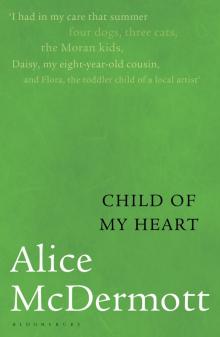 Child of My Heart
Child of My Heart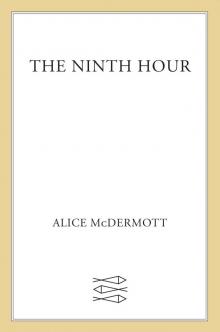 The Ninth Hour
The Ninth Hour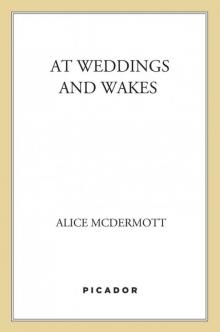 At Weddings and Wakes
At Weddings and Wakes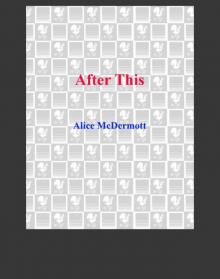 After This
After This That Night
That Night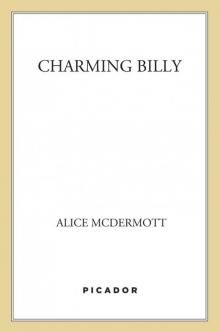 Charming Billy
Charming Billy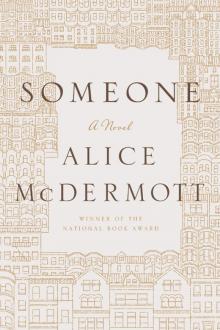 Someone
Someone